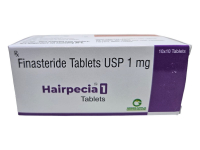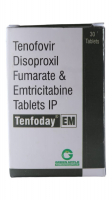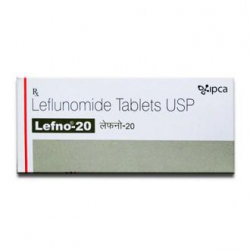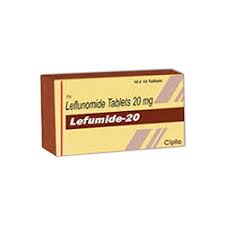


Leflunomide
Leflunomide Uses
This medication is used to treat rheumatoid arthritis, a condition in which the body's defense system (immune system) fails to recognize the body as itself and attacks the healthy tissues around the joints. Leflunomide helps to reduce the joint damage/pain/swelling and helps you to move better. It works by weakening your immune system and decreasing swelling (inflammation).
How to use Leflunomide
Take this medication by mouth with or without food, usually once daily or as directed by your doctor. Take this medication exactly as prescribed. You may be instructed to take a higher dose for the first 3 days of treatment.
Dosage is based on your medical condition and response to therapy.
Take this medication regularly in order to get the most benefit from it. To help you remember, take it at the same time each day.
After treatment is stopped, a different drug (cholestyramine) may be given as directed to help remove leflunomide from your body. This procedure is used if you need a rapid removal of the drug from your system (for example, if you are a female/male planning to have children, or suffering from severe side effects). Without the procedure, the drug may stay in your body for up to 2 years. Consult your doctor or pharmacist for more details.
Inform your doctor if your symptoms persist or worsen.
Leflunomide Side Effects
Diarrhea, nausea, and dizziness may occur. If any of these effects persist or worsen, tell your doctor or pharmacist promptly.
Remember that your doctor has prescribed this medication because he or she has judged that the benefit to you is greater than the risk of side effects. Many people using this medication do not have serious side effects.
Tell your doctor right away if you have any serious side effects, including: cough, numbness/tingling of hands/feet, hair loss, chest pain, fast/pounding heartbeat, increased thirst/urination, muscle cramp/pain, mental/mood changes, vision changes, easy bruising/bleeding, unusual growths/lumps, unexplained weight loss, unusual tiredness.
This medication may raise your blood pressure. Check your blood pressure regularly and tell your doctor if the results are high.
This medication may lower your ability to fight infections. This may make you more likely to get a serious (rarely fatal) infection or make any infection you have worse. Get medical help right away if you have any signs of infection (such as sore throat that doesn't go away, fever, swollen lymph nodes, chills).
A very serious allergic reaction to this drug is rare. However, get medical help right away if you notice any symptoms of a serious allergic reaction, including: rash, itching/swelling (especially of the face/tongue/throat), severe dizziness, trouble breathing.
Leflunomide can commonly cause a mild rash that is usually not serious. However, you may not be able to tell it apart from a rare rash that could be a sign of a severe allergic reaction. Get medical help right away if you develop any rash.
This is not a complete list of possible side effects. If you notice other effects not listed above, contact your doctor or pharmacist.
Leflunomide Precautions
Before taking leflunomide, tell your doctor or pharmacist if you are allergic to it; or to teriflunomide; or if you have any other allergies. This product may contain inactive ingredients, which can cause allergic reactions or other problems. Talk to your pharmacist for more details.
Before using this medication, tell your doctor or pharmacist your medical history, especially of: immune system disorder (e.g., HIV infection), current/recent infection (e.g., tuberculosis), cancer, bone marrow/blood disorder, kidney disease, liver disease (e.g., hepatitis B or C), alcohol abuse, heart disease (e.g., congestive heart failure), high blood pressure, lung disease.
This drug may make you dizzy. Alcohol or marijuana (cannabis) can make you more dizzy. Do not drive, use machinery, or do anything that needs alertness until you can do it safely. Avoid alcoholic beverages. Talk to your doctor if you are using marijuana (cannabis). Alcohol may also cause liver disease.
Do not have immunizations/vaccinations without the consent of your doctor, and avoid contact with people who have recently received oral polio vaccine or flu vaccine inhaled through the nose.
Since this medication can increase your risk of developing serious infections, wash your hands well to prevent the spread of infections. Avoid contact with people who have illnesses that may spread to others (e.g., flu, chickenpox).
This medication must not be used during pregnancy. It may harm an unborn baby. Before starting this medication, women of childbearing age must have a negative pregnancy test before starting this medication. Men and women must use effective forms of birth control (e.g., condoms and birth control pills) while taking this medication. Consult your doctor for more details and to discuss reliable forms of birth control. (See also Warning section.)
It is not known whether this medication affects the sperm. To minimize any possible risk, the manufacturer recommends that men wishing to father a child should consider stopping the medication and using another drug (cholestyramine) as directed to help this drug leave the body before attempting to father a child. (See How to Use section.) Consult your doctor for more details.
This drug may pass into breast milk and could have undesirable effects on a nursing infant. Therefore, breast-feeding is not recommended while using this drug. Consult your doctor before breast-feeding.
Leflunomide Interactions
See also How to Use Section.
Drug interactions may change how your medications work or increase your risk for serious side effects. This document does not contain all possible drug interactions. Keep a list of all the products you use (including prescription/nonprescription drugs and herbal products) and share it with your doctor and pharmacist. Do not start, stop, or change the dosage of any medicines without your doctor's approval.
Some products that may interact with this drug include: warfarin, rifamycins (e.g., rifampin), drugs affecting the liver (e.g., methotrexate), cholestyramine, other drugs that weaken the immune system (e.g., tacrolimus, cyclosporine).
Because teriflunomide (used to treat multiple sclerosis) is very similar to this medication, do not take it while you are taking leflunomide.
Note: We strongly encourage you to talk with your health care professional about your specific medical condition and treatments. The information contained in this website is meant to be helpful and educational, but is not a substitute for medical advice.
Leflunomide View Uses, Side Effects and Medicines, cost, Leflunomide price.















